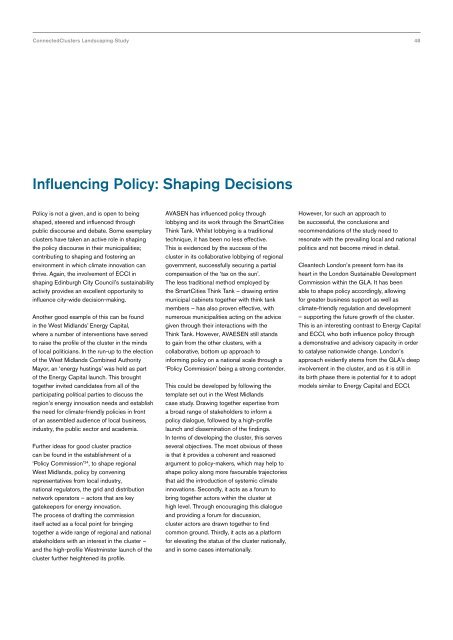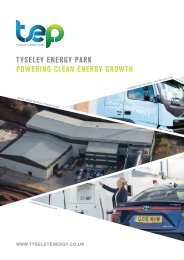connected-clusters-report-energy
Clustering innovation to create thriving and prosperous low-carbon cities and regions
Clustering innovation to create thriving and prosperous low-carbon cities and regions
You also want an ePaper? Increase the reach of your titles
YUMPU automatically turns print PDFs into web optimized ePapers that Google loves.
ConnectedClusters Landscaping Study 48<br />
Influencing Policy: Shaping Decisions<br />
Policy is not a given, and is open to being<br />
shaped, steered and influenced through<br />
public discourse and debate. Some exemplary<br />
<strong>clusters</strong> have taken an active role in shaping<br />
the policy discourse in their municipalities;<br />
contributing to shaping and fostering an<br />
environment in which climate innovation can<br />
thrive. Again, the involvement of ECCI in<br />
shaping Edinburgh City Council’s sustainability<br />
activity provides an excellent opportunity to<br />
influence city-wide decision-making.<br />
Another good example of this can be found<br />
in the West Midlands’ Energy Capital,<br />
where a number of interventions have served<br />
to raise the profile of the cluster in the minds<br />
of local politicians. In the run-up to the election<br />
of the West Midlands Combined Authority<br />
Mayor, an ‘<strong>energy</strong> hustings’ was held as part<br />
of the Energy Capital launch. This brought<br />
together invited candidates from all of the<br />
participating political parties to discuss the<br />
region’s <strong>energy</strong> innovation needs and establish<br />
the need for climate-friendly policies in front<br />
of an assembled audience of local business,<br />
industry, the public sector and academia.<br />
Further ideas for good cluster practice<br />
can be found in the establishment of a<br />
‘Policy Commission’ 24 , to shape regional<br />
West Midlands, policy by convening<br />
representatives from local industry,<br />
national regulators, the grid and distribution<br />
network operators – actors that are key<br />
gatekeepers for <strong>energy</strong> innovation.<br />
The process of drafting the commission<br />
itself acted as a focal point for bringing<br />
together a wide range of regional and national<br />
stakeholders with an interest in the cluster –<br />
and the high-profile Westminster launch of the<br />
cluster further heightened its profile.<br />
AVASEN has influenced policy through<br />
lobbying and its work through the SmartCities<br />
Think Tank. Whilst lobbying is a traditional<br />
technique, it has been no less effective.<br />
This is evidenced by the success of the<br />
cluster in its collaborative lobbying of regional<br />
government, successfully securing a partial<br />
compensation of the ‘tax on the sun’.<br />
The less traditional method employed by<br />
the SmartCities Think Tank – drawing entire<br />
municipal cabinets together with think tank<br />
members – has also proven effective, with<br />
numerous municipalities acting on the advice<br />
given through their interactions with the<br />
Think Tank. However, AVAESEN still stands<br />
to gain from the other <strong>clusters</strong>, with a<br />
collaborative, bottom up approach to<br />
informing policy on a national scale through a<br />
‘Policy Commission’ being a strong contender.<br />
This could be developed by following the<br />
template set out in the West Midlands<br />
case study. Drawing together expertise from<br />
a broad range of stakeholders to inform a<br />
policy dialogue, followed by a high-profile<br />
launch and dissemination of the findings.<br />
In terms of developing the cluster, this serves<br />
several objectives. The most obvious of these<br />
is that it provides a coherent and reasoned<br />
argument to policy-makers, which may help to<br />
shape policy along more favourable trajectories<br />
that aid the introduction of systemic climate<br />
innovations. Secondly, it acts as a forum to<br />
bring together actors within the cluster at<br />
high level. Through encouraging this dialogue<br />
and providing a forum for discussion,<br />
cluster actors are drawn together to find<br />
common ground. Thirdly, it acts as a platform<br />
for elevating the status of the cluster nationally,<br />
and in some cases internationally.<br />
However, for such an approach to<br />
be successful, the conclusions and<br />
recommendations of the study need to<br />
resonate with the prevailing local and national<br />
politics and not become mired in detail.<br />
Cleantech London’s present form has its<br />
heart in the London Sustainable Development<br />
Commission within the GLA. It has been<br />
able to shape policy accordingly, allowing<br />
for greater business support as well as<br />
climate-friendly regulation and development<br />
– supporting the future growth of the cluster.<br />
This is an interesting contrast to Energy Capital<br />
and ECCI, who both influence policy through<br />
a demonstrative and advisory capacity in order<br />
to catalyse nationwide change. London’s<br />
approach evidently stems from the GLA’s deep<br />
involvement in the cluster, and as it is still in<br />
its birth phase there is potential for it to adopt<br />
models similar to Energy Capital and ECCI.




